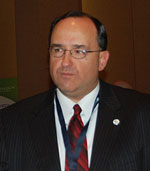 Algae-biodiesel production company Solazyme, Inc. will be featuring its SoladieselRD(TM), the world’s first algal-based renewable diesel, at a summit this week in California.
Algae-biodiesel production company Solazyme, Inc. will be featuring its SoladieselRD(TM), the world’s first algal-based renewable diesel, at a summit this week in California.
This company press release posted on MarketWatch.com says SoladieselRD(TM) will be showcased at the Governor’s Global Climate Summit in Beverly Hills, CA, Nov. 18th-19th:
“We are glad to be a part of Governor Schwarzenegger’s Global Climate Summit and applaud him for bringing together U.S. and international leaders to address this critical issue. Moving towards the Copenhagen meeting in December, these opportunities to discuss all solutions to the global climate crisis have become vitally important,” said Harrison Dillon, co-founder, president and CTO of Solazyme. “In this search for solutions, Solazyme has taken a 150 million year process of making oil and condensed it to a matter of days to renewably produce oil that can be converted into fuels that not only address these challenges, but have already been proven to be fully-scalable on a commercial level.”
Solazyme’s unique process grows algae in the dark in large industrial fermentation tanks, where the algae are fed a variety of non-food and waste biomass materials including glycerol and cellulosic biomass. This allows the company to produce oil with a very low carbon footprint efficiently in a controlled environment. Solazyme’s fuels have already been road tested in unmodified vehicles for thousands of miles. Solazyme also recently announced that it has produced the world’s first algal based jet fuel which met all eleven of the tested key criteria for (ASTM) D1655 (Jet A-1). Additionally, Solazyme’s process is the very first bridge from non–food carbohydrates and certain industrial waste streams to edible oils and oleochemicals.
The folks at Solazyme would love to talk to people, one-on-one during the summit. Contact Beth Starkin at 212-931-6108 or bstarkin@peppercom.com.



 In this “Ethanol Report” podcast, Geoff Cooper of the
In this “Ethanol Report” podcast, Geoff Cooper of the  The newly formed ethanol advocacy group,
The newly formed ethanol advocacy group,  The new organization will be “working very closely together” with the
The new organization will be “working very closely together” with the  The state, according to the council, has an additional $250,000 in grant funding available to fund the use of soy biodiesel in state school buses. The program was included in Gov. Ted Strickland’s biennium budget as the result of work done by the council and the Ohio Farm Bureau.
The state, according to the council, has an additional $250,000 in grant funding available to fund the use of soy biodiesel in state school buses. The program was included in Gov. Ted Strickland’s biennium budget as the result of work done by the council and the Ohio Farm Bureau. Blackhawk Biofuels has announced it will cut the ribbon on its newest biodiesel plant this coming Wednesday (Nov. 19) in Danville, Illinois, with production at the 45-million-gallon-a-year facility to start the next day.
Blackhawk Biofuels has announced it will cut the ribbon on its newest biodiesel plant this coming Wednesday (Nov. 19) in Danville, Illinois, with production at the 45-million-gallon-a-year facility to start the next day. This past summer, when oil prices were skyrocketing past $145 a barrel, one man was saying that the price would fall back to $60. People laughed and said we had seen the end of less-than-$100-a-barrel oil. Well, that price has dropped below $60, and 82-year-old oil analyst Henry Groppe has proved his critics wrong… again.
This past summer, when oil prices were skyrocketing past $145 a barrel, one man was saying that the price would fall back to $60. People laughed and said we had seen the end of less-than-$100-a-barrel oil. Well, that price has dropped below $60, and 82-year-old oil analyst Henry Groppe has proved his critics wrong… again. While it might have a past deeply rooted in petroleum, attendees of the Oklahoma Biofuels Conference in Oklahoma City this week were told renewable energy has a huge future in the Sooner State.
While it might have a past deeply rooted in petroleum, attendees of the Oklahoma Biofuels Conference in Oklahoma City this week were told renewable energy has a huge future in the Sooner State. Luxury vehicles, exotic new rides, and the latest in domestic developments are all part of any auto show. Add to that list the environmentally-friendly aspects of a new car at this year’s San Francisco Chronicle|SF Gate.com 51st Annual International Auto Show.
Luxury vehicles, exotic new rides, and the latest in domestic developments are all part of any auto show. Add to that list the environmentally-friendly aspects of a new car at this year’s San Francisco Chronicle|SF Gate.com 51st Annual International Auto Show. The U.S. Environmental Protection Agency has published environmental regulatory rules and requirements for the construction and operation of biodiesel production facilities.
The U.S. Environmental Protection Agency has published environmental regulatory rules and requirements for the construction and operation of biodiesel production facilities.